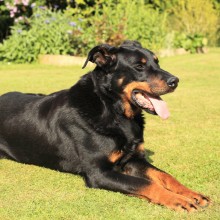Beauceron
Lifestyle Needs
 The Beauceron is said to originate from the French Plains of Beauce and the French also refer to the breed as Bas Rouge (Red Stockings). He is a very active and agile dog and was used as a livestock herder and guarder. He will need at least two hours of exercise every day. The Beauceron’s coat will need grooming more than once a week and does shed. He needs to live in a large house with a large garden. The Beauceron is said to be tolerant by nature and good with children but as with all breeds, individual dogs will vary. His average lifespan is 10 years.
The Beauceron is said to originate from the French Plains of Beauce and the French also refer to the breed as Bas Rouge (Red Stockings). He is a very active and agile dog and was used as a livestock herder and guarder. He will need at least two hours of exercise every day. The Beauceron’s coat will need grooming more than once a week and does shed. He needs to live in a large house with a large garden. The Beauceron is said to be tolerant by nature and good with children but as with all breeds, individual dogs will vary. His average lifespan is 10 years.
Genetic Diversity
(Known as Coefficient of Inbreeding: 'COI'. It should be as low as possible.)
The UK Kennel Club breed average COI is 0.6% - See 'A Beginners Guide to COI'
Gene Pool Size
(Known as Effective Population Size: 'EPS')
TBC
EPS is a measure of how many individuals are contributing genetically to a breed population. It is a measure of the size of the gene pool in a breed. Lower than 100 is considered critical by conservationists and below 50 brings a breed close to extinction. For more information see the Kennel Club article.
Health and Welfare Problems due to Conformation
(Body shape and physical characteristics)
- Gastric Dilatation Volvulus (Bloat/torsion)
BVA/KC Health Schemes: www.bva.co.uk/chs
- Hip Dysplasia: breed 5 year mean score 10.3 (parents should be lower)
- Elbow Dysplasia
- Eye Scheme
Estimated Breeding Values (EBVs) : No EBVs are currently available for this breed
www.thekennelclub.org.uk/about-ebvs
DNA Tests Available
DogWellNet and IPFD Harmonisation of Genetic Testing for Dogs (HGTD)
www.dogwellnet.com/breeds
- von Willebrands Disease (vWD 1)
Availability of a DNA test does not mean that it is always necessary or even desirable for breeders to use this test.
Other Breed-Specific Health Screening Schemes
None known
Ask the breeder to show you the certificates for the above tests/screening for both parents. If any of the above tests have not been considered necessary by the breeder (and there may be good reasons), ask her to explain why.
Other Diseases Reported
(For which there are currently no genetic or screening tests for sire or dam)
- Cancer: mast cell tumour; squamous cell carcinoma – digit
Ask the breeder about the medical history of the parents, grandparents and great grandparents. Consider carefully whether to purchase a puppy if some of these or other diseases are in the family line.
Ask about the breeder’s policy in cases of serious genetic diseases occurring to your puppy in later life. Good breeders will request to be informed of such events in order to improve future breeding decisions.
You are strongly advised to buy from a breeder who uses (or is prepared to use) the AWF Puppy Contract and Puppy Information Pack (PIP): www.puppycontract.org.uk
The breeder should also be familiar with the CFSG/DBRG Code of Practice for Dog Breeding